This article needs additional citations for verification .(February 2024) |
"Prince Hohenstiel-Schwangau, Saviour of Society" is a long poem by Robert Browning, first published in 1871. [1]
This article needs additional citations for verification .(February 2024) |
"Prince Hohenstiel-Schwangau, Saviour of Society" is a long poem by Robert Browning, first published in 1871. [1]
The poem, which takes the French Emperor Napoleon III as its subject, was largely written in Florence in the early 1860s before apparently being abandoned. It appears that the poem was largely forgotten while Browning worked on Dramatis Personae and The Ring and the Book , which raised his profile and commercial appeal. In 1871, following the Franco-Prussian War and the forced end of Napoleon's reign, Browning dusted off his lengthy poem and made some revisions and additions before publishing it as Prince Hohenstiel-Schwangau in December 1871.
Sales were initially very strong, with more than one and a half thousand copies being sold in the first week, but they soon tailed off sharply; the poem's length and complexity apparently put off prospective readers, and the first printing run failed to sell out. No second edition was ever required. Some critics have called this poem the least-read of all Browning's works, though unlike Sordello 31 years earlier, the poem's reception had no discernible damaging effect on his continued popularity and strong critical reputation.

Kakinomoto no Hitomaro was a Japanese waka poet and aristocrat of the late Asuka period. He was the most prominent of the poets included in the Man'yōshū, the oldest waka anthology, but apart from what can be gleaned from hints in the Man'yōshū, the details of his life are largely uncertain. He was born to the Kakinomoto clan, based in Yamato Province, probably in the 650s, and likely died in Iwami Province around 709.

Ossian is the narrator and purported author of a cycle of epic poems published by the Scottish poet James Macpherson, originally as Fingal (1761) and Temora (1763), and later combined under the title The Poems of Ossian. Macpherson claimed to have collected word-of-mouth material in Scottish Gaelic, said to be from ancient sources, and that the work was his translation of that material. Ossian is based on Oisín, son of Fionn mac Cumhaill, a legendary bard in Irish mythology. Contemporary critics were divided in their view of the work's authenticity, but the current consensus is that Macpherson largely composed the poems himself, drawing in part on traditional Gaelic poetry he had collected.
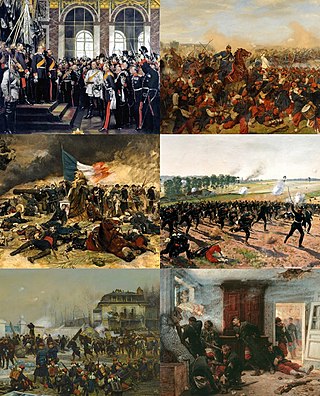
The Franco-Prussian War or Franco-German War, often referred to in France as the War of 1870, was a conflict between the Second French Empire and the North German Confederation led by the Kingdom of Prussia. Lasting from 19 July 1870 to 28 January 1871, the conflict was caused primarily by France's determination to reassert its dominant position in continental Europe, which appeared in question following the decisive Prussian victory over Austria in 1866. According to some historians, Prussian chancellor Otto von Bismarck deliberately provoked the French into declaring war on Prussia in order to induce four independent southern German states—Baden, Württemberg, Bavaria and Hesse-Darmstadt—to join the North German Confederation; other historians contend that Bismarck exploited the circumstances as they unfolded. All agree that Bismarck recognized the potential for new German alliances, given the situation as a whole.

Robert Browning was an English poet and playwright whose dramatic monologues put him high among the Victorian poets. He was noted for irony, characterization, dark humour, social commentary, historical settings and challenging vocabulary and syntax.

Lucien Bonaparte, 1st Prince of Canino and Musignano, was a French politician and diplomat of the French Revolution and the Consulate. He served as Minister of the Interior from 1799 to 1800 and as the president of the Council of Five Hundred in 1799.

Napoleon III was the first president of France from 1848 to 1852, and the last monarch of France as Emperor of the French from 1852 until he was deposed in absentia on 4 September 1870.

Napoléon, Prince Imperial, also known as Louis-Napoléon, was the only child of Napoleon III, Emperor of the French, and Empress Eugénie. After his father was dethroned in 1870, he moved to England with his family. On his father's death in January 1873, he was proclaimed by the Bonapartist faction as Napoleon IV.

Chislehurst is a suburban district of south-east London, England, in the London Borough of Bromley. It lies east of Bromley, south-west of Sidcup and north-west of Orpington, 10 miles (16 km) south-east of Charing Cross. Before the creation of Greater London in 1965, it was in Kent.
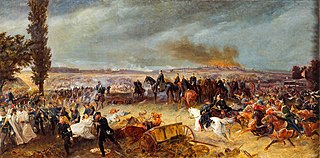
The Austro-Prussian War, also by many variant names such as Seven Weeks' War, German Civil War, Brothers War or Fraternal War, known in Germany as Deutscher Krieg, Deutscher Bruderkrieg and by a variety of other names, was fought in 1866 between the Austrian Empire and the Kingdom of Prussia, with each also being aided by various allies within the German Confederation. Prussia had also allied with the Kingdom of Italy, linking this conflict to the Third Independence War of Italian unification. The Austro-Prussian War was part of the wider rivalry between Austria and Prussia, and resulted in Prussian dominance over the German states.
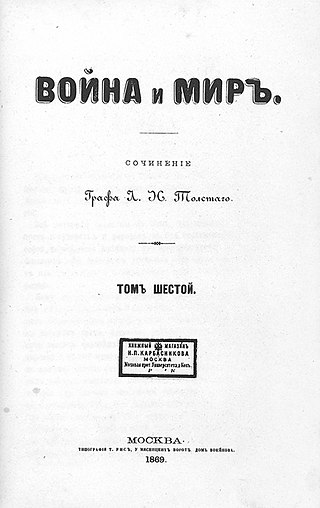
War and Peace is a literary work by Russian author Leo Tolstoy. Set during the Napoleonic Wars, the work mixes fictional narrative with chapters discussing history and philosophy. First published serially beginning in 1865, the work was rewritten and published in its entirety in 1869. It is regarded, with Anna Karenina, as Tolstoy's finest literary achievement and remains an internationally praised classic of world literature.

John William Burgon was an English Anglican divine who became the Dean of Chichester Cathedral in 1876. He was known during his lifetime for his poetry and his defense of the historicity and Mosaic authorship of Genesis. Long after his death he was remembered chiefly for his defense of the Byzantine text-type and continued ecclesiastical use of the traditional Received Text.
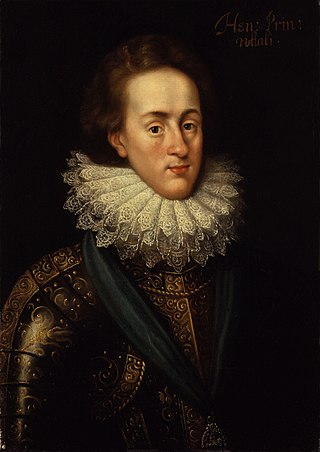
Henry Frederick, Prince of Wales,, was the eldest son and heir apparent of James VI and I, King of England and Scotland; and his wife Anne of Denmark. His name derives from his grandfathers: Henry Stuart, Lord Darnley; and Frederick II of Denmark. Prince Henry was widely seen as a bright and promising heir to his father's thrones. However, at the age of 18, he predeceased his father, dying of typhoid fever. His younger brother Charles succeeded him as heir apparent to the English, Irish, and Scottish thrones.

Edgar Quinet was a French historian and intellectual.

The Battle of Lodi was fought on 10 May 1796 between French forces under Napoleon Bonaparte and an Austrian rear guard led by Karl Philipp Sebottendorf at Lodi, Lombardy. The rear guard was defeated, but the main body of Johann Peter Beaulieu's Austrian Army had time to retreat.
The Napoleonic Wars continued from 1799 with the French fighting the forces of the Second Coalition. Napoleon Bonaparte had returned from Egypt and taken control of the French government, marking the end of the French Revolution. He prepared a new campaign, sending Moreau to the Rhine frontier and personally going to take command in the Alps, where French forces had been driven almost out of Italy in 1799.
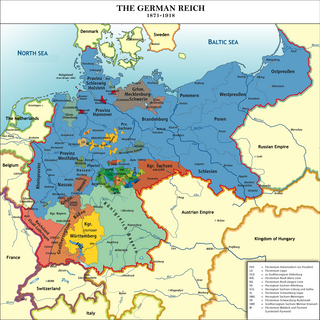
The unification of Germany was a process of building the first nation-state for Germans with federal features based on the concept of Lesser Germany. It commenced on 18 August 1866 with adoption of the North German Confederation Treaty establishing the North German Confederation, initially a military alliance de facto dominated by Prussia which was subsequently deepened through adoption of the North German Constitution. The process symbolically concluded when most of south German states joined the North German Confederation with the ceremonial proclamation of the German Empire i.e. the German Reich having 25 member states and led by the Kingdom of Prussia of Hohenzollerns on 18 January 1871; the event was later celebrated as the customary date of the German Empire's foundation, although the legally meaningful events relevant to the accomplishment of unification occurred on 1 January 1871 and 4 May 1871.

19th-century French literature concerns the developments in French literature during a dynamic period in French history that saw the rise of Democracy and the fitful end of Monarchy and Empire. The period covered spans the following political regimes: Napoleon Bonaparte's Consulate (1799–1804) and Empire (1804–1814), the Restoration under Louis XVIII and Charles X (1814–1830), the July Monarchy under Louis Philippe d'Orléans (1830–1848), the Second Republic (1848–1852), the Second Empire under Napoleon III (1852–1871), and the first decades of the Third Republic (1871–1940).
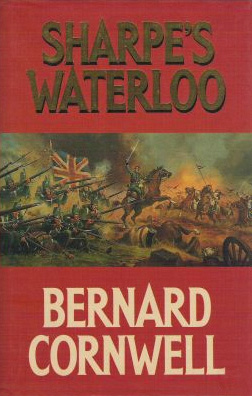
Sharpe's Waterloo is a historical novel in the Richard Sharpe series by Bernard Cornwell. Originally published in 1990 under the title Waterloo, it is the eleventh novel of the Sharpe series and the twentieth novel in chronological order. Cornwell stated that he intended to end the series here, but later changed his mind.
— From Lewis Carroll's "Jabberwocky", published as part of Through the Looking Glass
"Thinking" is a poem written by Walter D. Wintle, a poet who lived in the late 19th and early 20th century. Little to nothing is known about any details of his life. "Thinking" is also known as "The Man Who Thinks He Can".